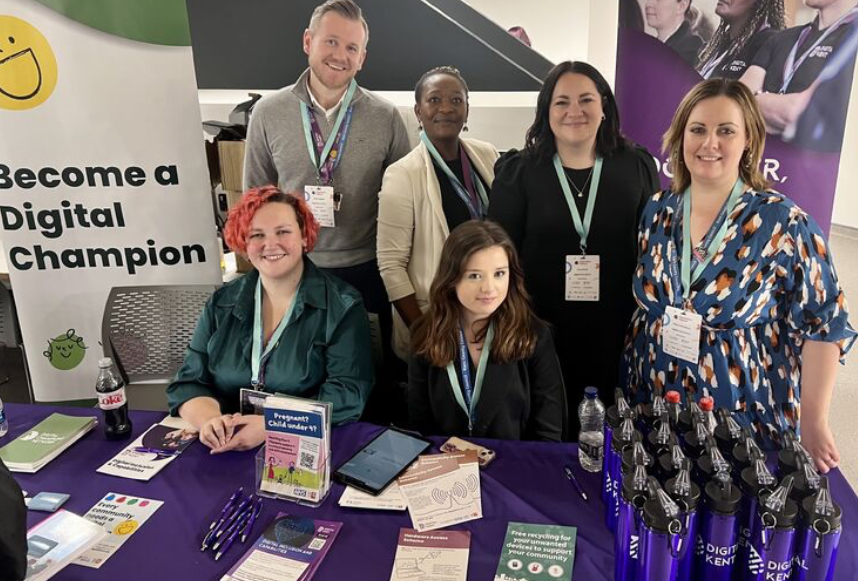Digital Kent was set up by Kent County Council to improve digital inclusion across the county, linking and supporting digital schemes and running one of the biggest networks of volunteer Digital Champions in the UK. But how do you set up a cross-county digital initiative and build and run a successful network at scale?
Digital Kent: the background
Kent is one of the biggest counties geographically and it's very diverse, with pockets of wealth as well as deprivation, big cities, rural areas, and residents who speak more than 40 languages.
The Council was aware of the growing need for a digital skills initiative. This need increased during the pandemic and the cost of living crisis and as response they set up Digital Kent. The funding came from the Financial Hardship Fund, where the project still sits and is funded until 2025.
The programme delivers in three main areas: devices, connectivity and skills. The skills piece is delivered via a network of Digital Champions. It supports existing digital skills programmes and fills the gaps where there aren’t ones. This means working with a huge range of voluntary organisations and district councils as well as directly recruiting and managing volunteers who become Champions.
“It’s all about relationships”
We spoke to Chloe Johnstone, Relationships and Skills Manager (Deputy Lead) about setting up and running such a big network.
Top Five Learnings from setting up a Digital Network
1. Don’t just rely on “facts and stats”
“Get to know people on the ground." Digital Kent spent time finding out was happening across the county. "Digital Engagement officers went out and they spoke to everyone and anyone. When people are trying to set things up like this – you’ve got reports, dates, numbers, facts and figures. But it's one thing having the data, actually going out and talking is completely different. We started working with people and speaking to them about their challenges – that had a huge impact on how we approached it."
2. Rethink after research
Use what you've learnt to adapt your approach. “After Year One, when we’d had a whole team that had gone out and talked to different people and interacted, we restructured our team.”
The type of support on offer completely changed. “We realised that 70% of demand was for 1-2-1 interaction. People want to sit across a table from you, with a device, with their questions, and have a conversation. That massively fed into how we approach it. That’s why we created digital hubs.”
3. Collaboration not control
There are lots of great organisations doing great things around digital skills. It won’t work if you come along and try to control them and make them conform to what you want.
“We encourage people to do their own thing and if they are, fantastic!”
Local groups have their own skills and expertise and the ideal is to support them to do it as well as they can, not dictate what they do.
It’s about taking things away from facts and figures and putting a bit of life and reality into the situation. And that uncovers the real challenges and barriers that people are facing. It was that more in-depth research, having conversations with residents, with people working with them. It’s so worthwhile and it changed our perspective.
Chloe Johnstone
Digital Kent, Deputy Lead
4. One size doesn’t fit all!
Kent is huge and diverse. Though Digital Kent runs a similar programme across the county, it’s not identical everywhere. “After our research, we looked at targeting particular areas”. For example, Thanet has high levels of deprivation, crime & unemployment, and a higher than average proportion of vulnerable people. It needed a different approach to find volunteers, encourage learners to come forward and a modified device-gifting scheme to reach the people who really needed it.
5. It's true for local councils too!
It’s not just need that varies from area to area, so do councils. Kent has twelve different districts, and each has its own priorities and delivery set-up. Some work closely with the voluntary sector, some don’t and no two districts are organised in the same way. This is where talking to people, really comes in… “You need to know the person who knows the person..”
What's next?
Digital Kent are moving on with ambitious plans, working with more organisations and aiming to have a Digital Champion in every... school... business... library. They have an updated strategy that focusses on provision that is tailored, empowering, accessible, cohesive and holistic. And they are making sure that the learnings from their network about digital skills and need feeds back into how wider council services are designed and delivered.
They've secured extra funding until 2025. But like all time-limited programmes, they need to consider what happens when or if the funding stops. The plan is that even if the co-ordination stops, much of the good the network does continues.
Whatever happens next, we'll keep you posted...
2024 Update
We caught up with Chloe again in Summer 2024 to find out about ongoing challenges and next steps for the growing Digital Kent network.
More from Kent
You've got a network coming together, now what?
All about Digital Champions
How and where do Champions models work?
A different model
How Brent Council use Digital Champions
